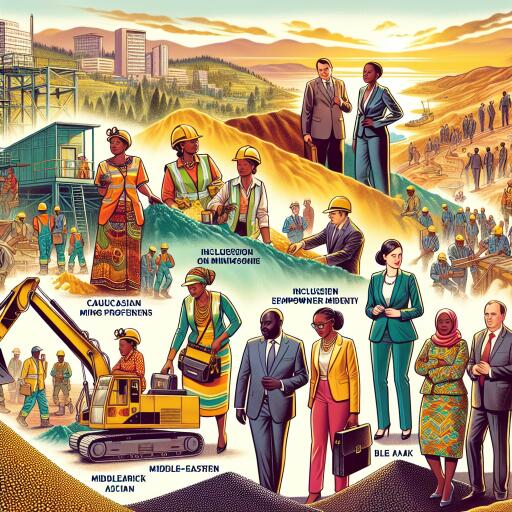More Women Needed In Rwanda’s Growing Mining Sector- Officials
In a significant stride towards gender equality within Rwanda’s burgeoning mining sector, the country marked the International Day of Women in Mining (IDWIM) with a solid pledge to bolster female participation and curb gender-based violence in this vital economic arena.
The festivities took place on June 14, 2024, at Trinity Nyakabingo Mine in Shyorongi Sector, Rulindo District, encapsulated by the theme “I am Mining and I Belong”. This sector, a critical source of foreign exchange revenue, second only to tourism, has seen impressive growth. Mining and quarrying operations not only benefit the workers and investors directly involved but also play a significant role in supporting their families and contributing to the national economy.
Rwanda’s mineral export revenues have seen an upward trajectory from $772 million to over $1.1 billion, edging closer to the ambitious target of $1.5 billion in annual revenues by 2024. Yet, despite these gains, the sector exhibits a stark gender disparity in employment statistics. Of the 57,379 workers in mining and quarrying, a mere 11.4% are women, overshadowed by an overwhelming 88.6% male workforce. Moreover, women’s presence in ownership roles within mining, quarrying companies, and cooperatives is notably low, with only 22 women owners, accounting for 16% against 116 men owners.
At the heart of the celebrations, the focus remained steadfast on Rwanda’s commitment to gender equality—a principle enshrined in the nation’s constitution and legal frameworks. Diane Nguruyimanzi, the National Women’s Council (CNF) Coordinator for Rulindo district, emphasized the constitutional mandate for a 30 percent representation of women across all sectors. To bridge the current gap in the mining sector, there calls for increased awareness of opportunities, alongside tailored skill development programs to enable women to compete effectively.
The president of Rwanda Women in Mining Association (RWIMA), Aline Providence Nkundibiza, highlighted the essential shift required in societal perceptions that traditionally view mining as a male-dominated career. She underscored the importance of establishing infrastructure such as Early Childhood Development Centers and Mother’s rooms to create a conducive working environment for women.
Trinity Metals, a leading mining entity in Rwanda, showcased its initiative to prioritize women in its development agenda. The company aims to raise women’s participation from 18% to 30% by 2030, recognizing the enhanced productivity, focus, and goal orientation women bring to the workforce. Diverse projects like the Trinity Women in Mining (TWIMA) association, which encompasses savings cooperatives and canteen projects worth over Rwf50Million, exhibit commendable strides towards this goal.
The observance of IDWIM was enriched with a week-long advocacy campaign on Family Planning and Gender-Based Violence across various mines. This initiative underscored the absence of reported gender-based violence incidents, yet illuminated the necessity for further research to fully understand women’s experiences and challenges within the mining sector. This encompasses disparities in opportunities, leadership roles, wages, and skills development.
Peter Geleta, CEO of Trinity Metals and a veteran in Africa’s mining sector, lauded the Rwandan government’s efforts in empowering women. He remarked that Rwanda sets a regional benchmark for fostering an environment conducive to women’s leadership and development within the mining sector. A steadfast zero-tolerance policy toward gender-based violence and abuse underscores a committed approach to safeguarding women in the workplace, encouraging immediate reporting and action on any incidents.
As Rwanda progresses, the call for increased female participation in its lucrative mining sector reflects a broader mandate for gender equality, ensuring that the fruits of economic growth are equitably shared.
